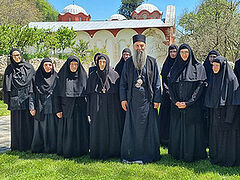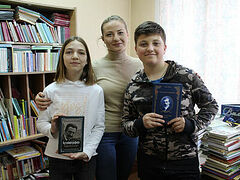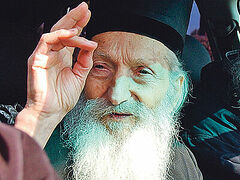“I often happen to travel on business to Belgrade, our capital. But even the mere thought of moving there for good sounds disgusting—my forefathers lived in Kosovo and Metohija, I was born and reside here. Why on earth should I abandon my motherland? Is it hard to live in Kosovo? Yes, absolutely. But it’s better here, at home with all the hardships, than anywhere else with their pies in the skies and false businesslike air,” says Jovan Zafirovic, Serbian journalist, and writer of songs and one-liners.
Many young Serbs from Kosovo and Metohija attempt to balance out the need of their heart, on the one hand, and the voice of reason, on the other. Their heart calls out: “Stay, live here;” the coldness of the head insists: “Leave.” There wasn’t such an inner conflict before, but the expulsion of the Orthodox Serbs from their towns, the economic crisis, and desolation of wartime did their part: Those who couldn’t imagine in their wildest dreams that they would have to abandon their homes, dismissing the mere idea as nonsense, are actually leaving Kosovo. Only the toughest, the most stubborn, and the hopeless optimists are here to stay.
“What drives me away from my homeland? The absence of even primitive, decent living conditions, and I think the majority of us will agree with this. What else? The unknown. Well, maybe even the darkness lying ahead. A dark future, the unknown, is like some evil power, steeped in fear. When you simply don’t understand certain things, you work to figure it out to add clarity – but when, for years, you see how all your attempts to figure things out end in failure and your work is doomed, you feel something akin to bottomless, unrelieved sorrow,” says Jovan.
For the younger generation, the stories about people in Kosovo and Metohija living well before and without any war, when some were even able to acquire some wealth, sound like legends or a fairy-tales. Were Serbs really able to safely travel around in Kosovo, reside in their towns, work at the factories, or travel and visit their faraway friends across the province? You mean, really? They did have jobs? Right here, at home? And no one spat at them? Right, tell me another!
We have to admit that nowadays, going to a nearby town is a wild ride—and not the most pleasant one—for the residents of the remaining Serbian villages and settlements, like Gnilane. That is, it isn’t a regular trip of a villager to a nearby town with all the necessary preparations and pleasant excitement—nothing of the kind. Say what you like, but you won’t get that. You either drive or walk to your former home, trying to make it look as if everything is alright. Your house has new inhabitants, their grown up children stare at you as if you were an alien, while their little offspring openly laugh at you. You can surely walk around your native town—no one will specifically bully you, especially if you are shopping at a small shopping center at the outskirts (because you are the customer, after all!). But there’s no way you can sit down with your friends at a café and talk about life or find out what’s new with them, speaking Serbian to boot; sure, you can do all of that, but only when you return to your village. But then, there’s absolutely no violence here; everything is “good” here. What an interesting rule: You spent your money—no one blew at you in the face, and now go! Bye-bye! And don’t say that some ethnic minorities suffer in Kosovo (aha, it was yours once!). But you should be thankful for anything you ethnic minority, pfft.
Speaking of ethnic minorities. The mass media—be it local, the so called “independent,” or the international, media sources—will never mention that the Serbs in the southern Kosovo, in Pomoravlje, still make up a third of a total number of Serbs in the province. This “minority” still resides, despite all the hardships, in the communities of Kosovo Kamenica, Gnilane, Novo Brdo, and Vitina.
Unfortunately, many of them are abandoning their native land. The homes built by their great-grandfathers, where grandfathers and fathers resided, are empty because the son has gone and resides with his family someplace abroad. There are many abandoned homes like that in our province and they reek of sorrow, grief, and despair. One can also see a lot of burned homes – they stand like a symbol of broken dreams, humiliation, and affliction of the generations.
All of this resulted in a situation wherein the Serbs of Kosovo and Metohija have to live under the stress of making a hard decision: Should they leave their motherland, and if yes, then where to. Jovan belongs to the postwar generation and presumes to know the answer:
“I was born just before the war, and I can only tell you about the life in Metohija and our villages the way it was remembered by our elders. From their stories I know that life was filled with joy, everything was in full swing, and people stood for each other, supporting, helping out, sharing joy and sorrow together. Following the NATO bombings everything remained the same for some time, but these days, things have changed radically: We are divided and isolated from one another. The older generation is dying off and those who are younger are leaving Kosovo for many reasons. Those who stay behind live in an atmosphere of distrust and hopelessness. But those who stay knowingly, out of principle, so to speak, place their hopes solely in God entrusting their lives in Him. ‘Christ is the only One who will never betray us,’ That’s what they say today and that’s what they experience in their lives.”
The Serbs’ distrust for the Albanian authorities of “independent Kosovo” and those who support these authorities in the West is easily understandable since it is well founded. The residents of Pomoravlje recall today with sweet sadness those Russian and Greek soldiers who were based not far from Gnilane and Vitina. The majority think that the presence of the Russian troops was the main reason why the Serbs were able to stay in their villages then. Besides, everyone treated the Russian soldiers as their own and not as foreigners. Nowadays, since the Russians left, the attitude to those foreign forces that “ensure safety,” is quite different to put it mildly.
It is just like relationships with one’s “dearest” neighbors. “Where do you live, huh? What language are you speaking here?! Learn the Albanian first, and then come get your paperwork!” Do you think this is a unique case? Come on, the same dialogues, or rather, monologues, are held almost daily in the offices of that “truly independent Kosovo,” when those “obnoxious Serbs” dare to apply, say, to get some information, ask for a benefit, or file a request to protect their rights—be it property or other rights. You see, they were robbed. They were beaten, you know. Their Church was desecrated. So what of it! Learn Albanian, you minority!
Many members of the so-called the “minority” who reside in the vicinity of the formerly Serbian Kamenica, Gnilane, or Priština, are left to their own devices. The villages inhabited by Serbs often lack decent roads, sewage, and cellular connections. As we are delivering humanitarian help to those villages, we often know we have reached our destination when the road suddenly switches from asphalt (laid for that “titular ethnic group”) to either a footpath or a phantom of a path. Poverty, desolation, gloom and doom. For such families, our arrival and the assistance we collected (often with help from the readers of Pravoslavie.ru) is like a light at the end of the tunnel. Sure, they thank us. Of course, they pray. And cry often. Well, we also often can’t hold back our tears either.
“How are you doing? “Good.” “Good” is a humiliatingly low benefit, below all and any poverty threshold that no one has ever recalculated or raised, of course. So, educate your children, buy food, and do everything else on it. “Everything is good.”
The Serbs in Kosovo and Metohija are careful about their wishes and plans, and they have learned not to get caught up in illusory daydreaming. Sufficient for the day is the evil thereof—that would probably be the name of the game here.
It is quite difficult to compare the life of the people in Kosovo and Metohija with other places in Serbia. Sometimes such a comparison is really frustrating—especially for those who have had to forsake their heart at home, in their beloved Kosovo:
“Belgrade is like a bird in the sky while Kosovo is like a bird in a cage—and by no means golden one. The difference is huge. People from well-fed Belgrade can make plans and daydream; as for the Kosovo Serbs, the chief concern is to see, as soon as you get up, if your home and the church are in one piece, your livestock is still in the barn, and the tractor isn’t stolen. Our priority here is to breathe freely. We are often misunderstood, unfortunately. Behind the daydreaming and making plans, those in Belgrade don’t hear a trumpet call sounding from Kosovo and Metohija,” says Jovan Zafirovic.
I think that real life is actually here, in Kosovo. It is full of hardship, sans pies in the skies or daydreaming and fake business-like manners. Instead, there is an often-inconceivable faith, an unbroken spirit, and patience. Against all odds.
Jovan Zafirovic was born and resides in Kosovo and Metohija. He is a journalist and the author of songbooks dedicated to his native land. He transferred the award money he has received for writing the best one-liner in a competition at the “Politika” newspaper to the kindergarten in Kosovo Pomoravlje. His work’s major objective is a non-biased portrayal of the life of Kosovo Serbs, their problems and joys; the suffering and faith of people who simply by their physical existence obstruct the politically correct official version of “a worthy choice to achieve Western values in independent Kosovo.”









